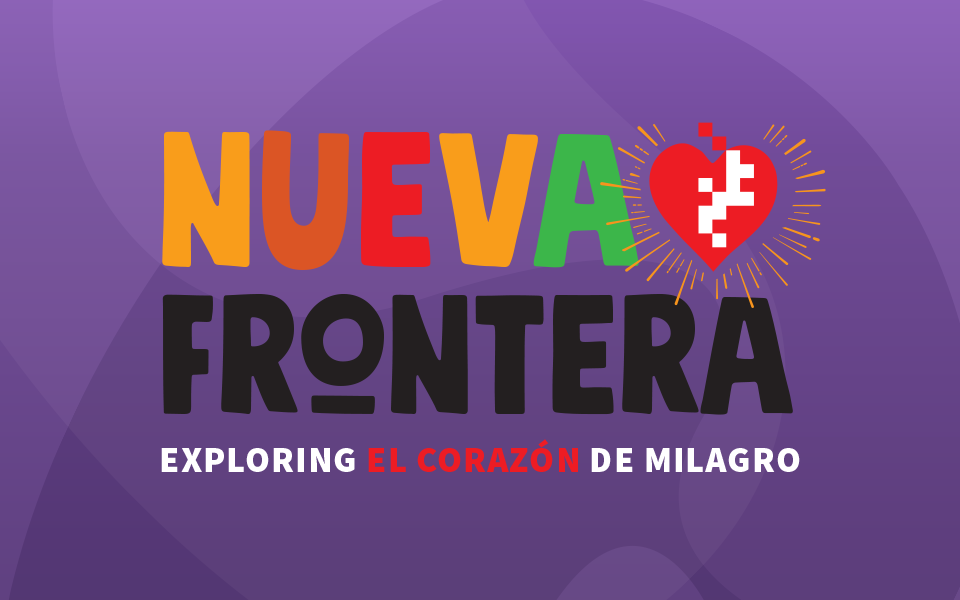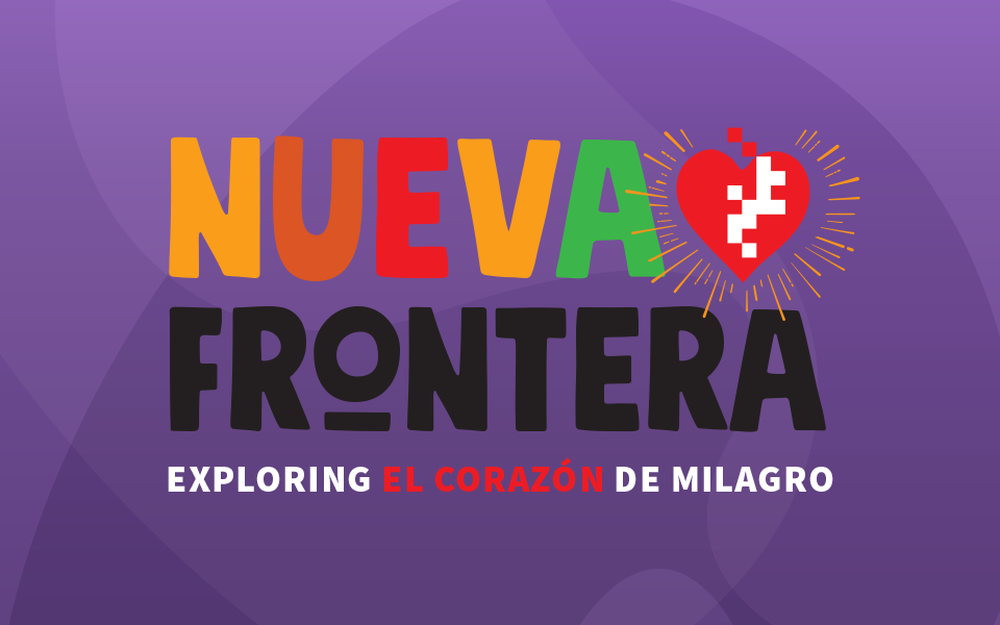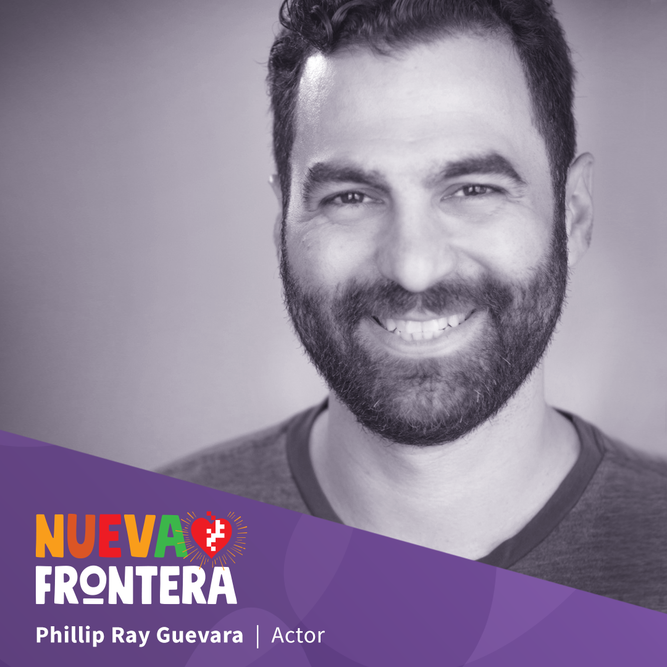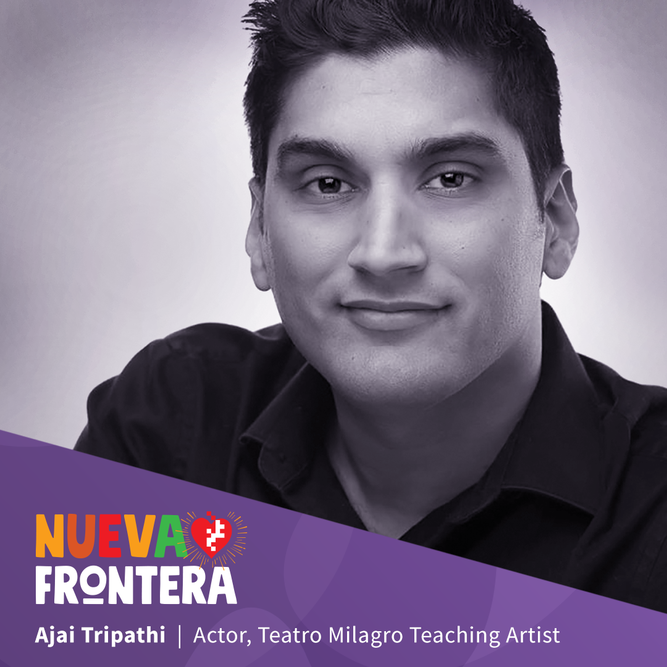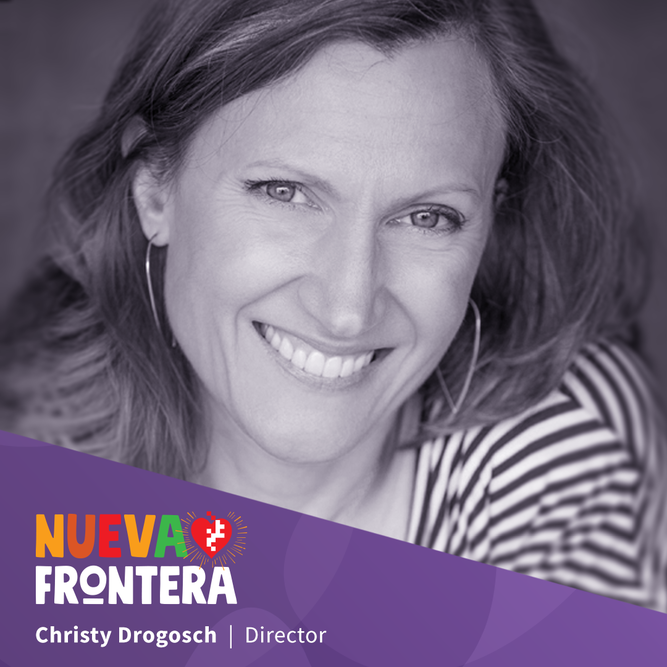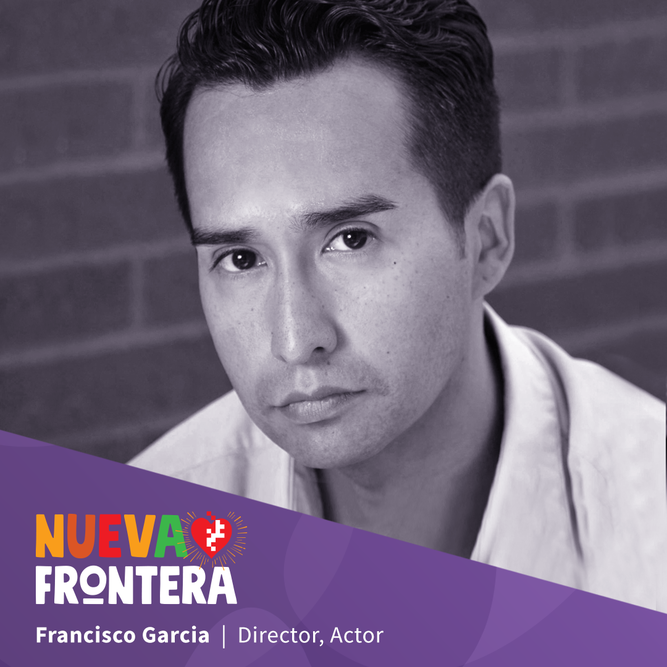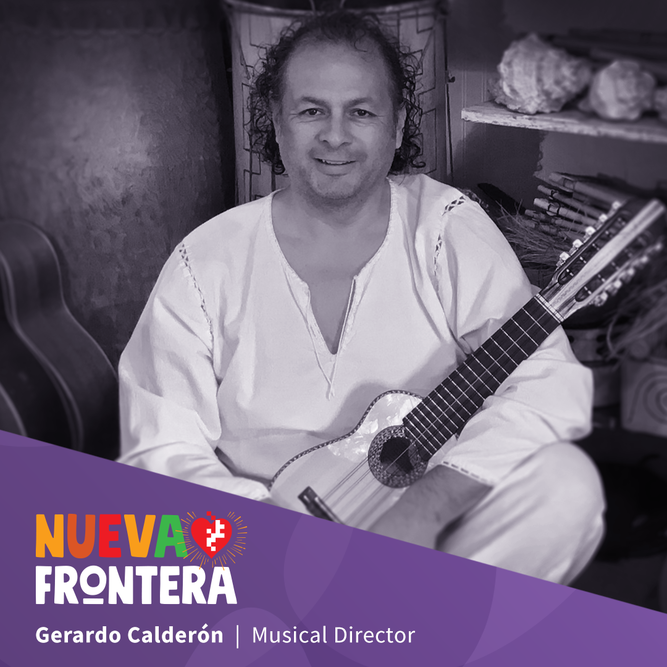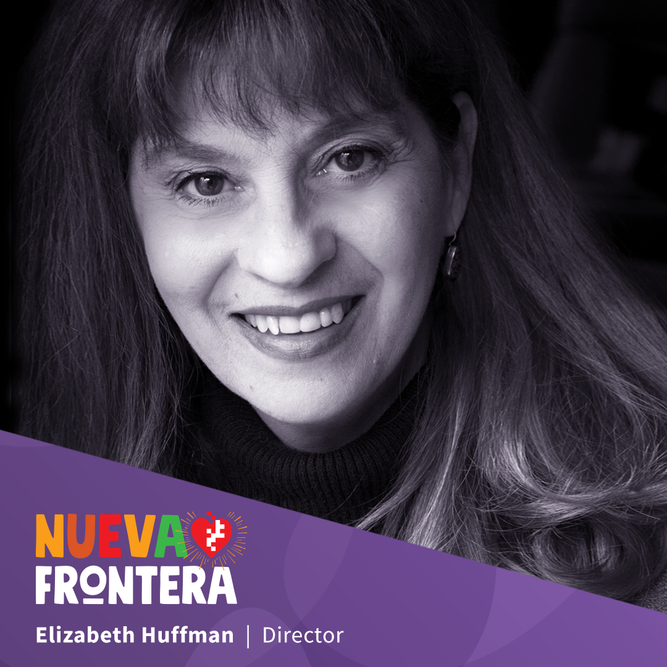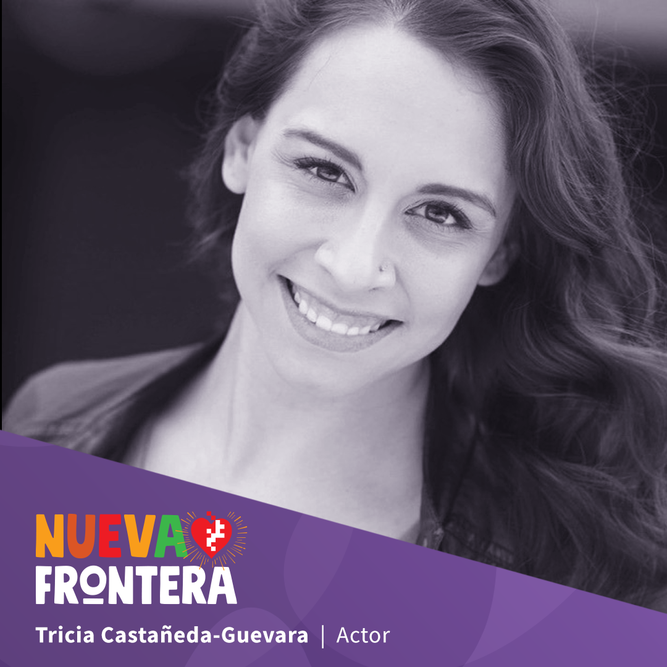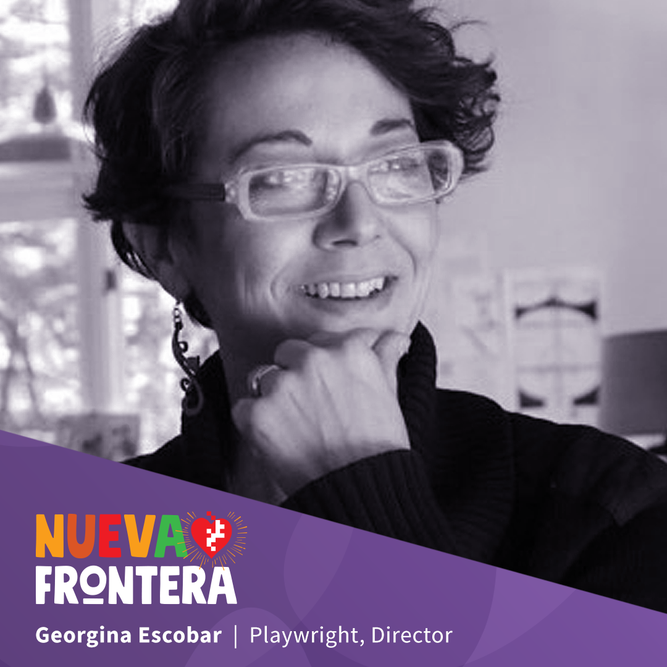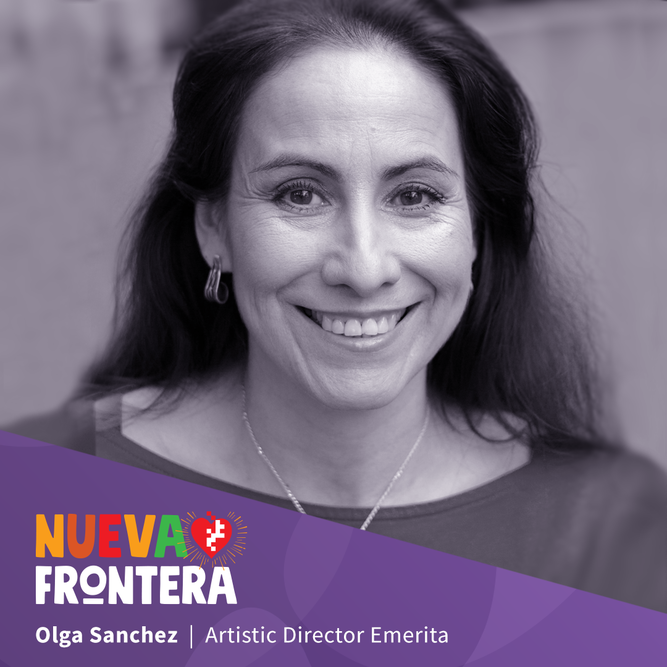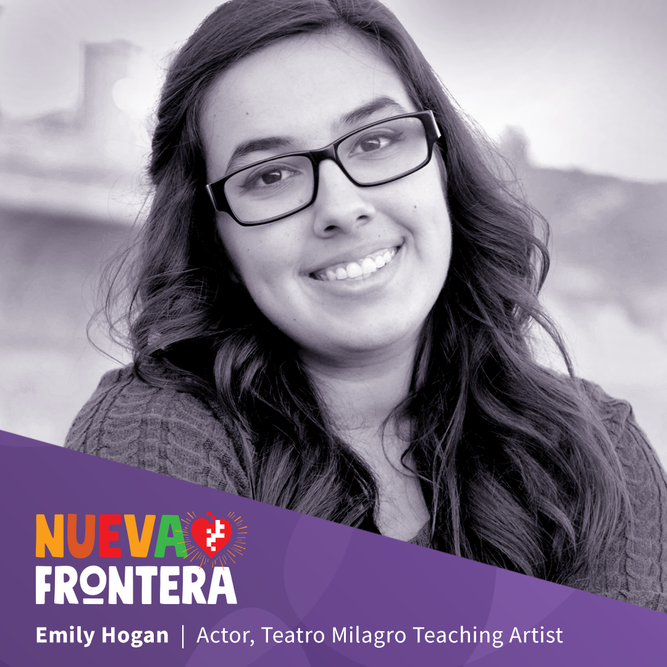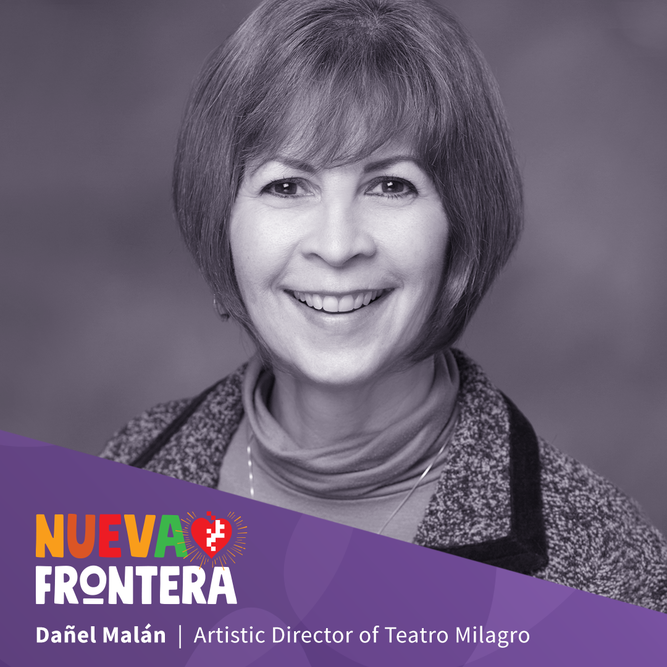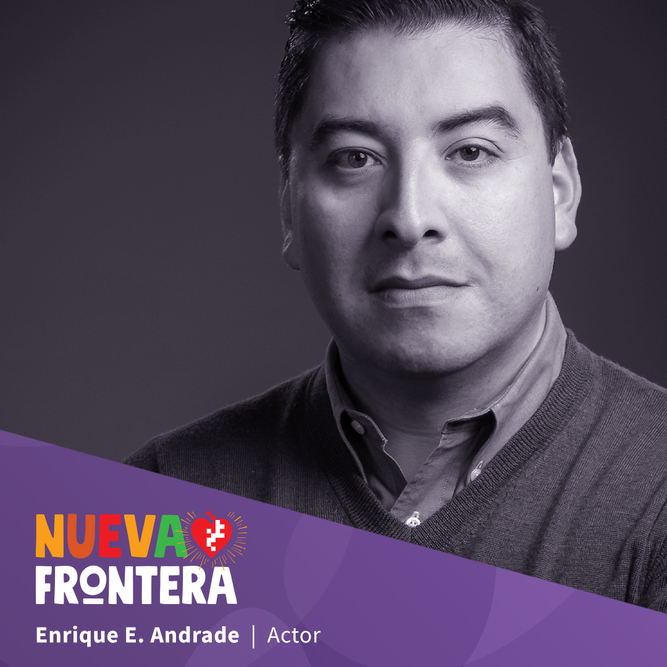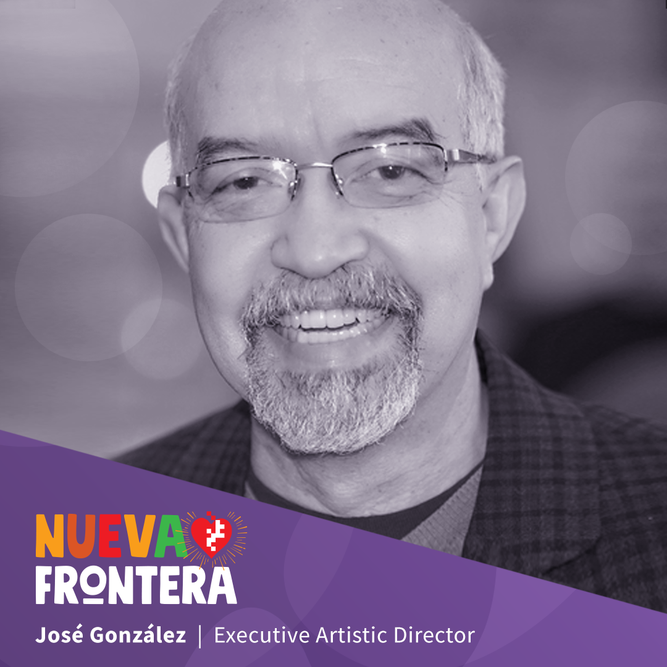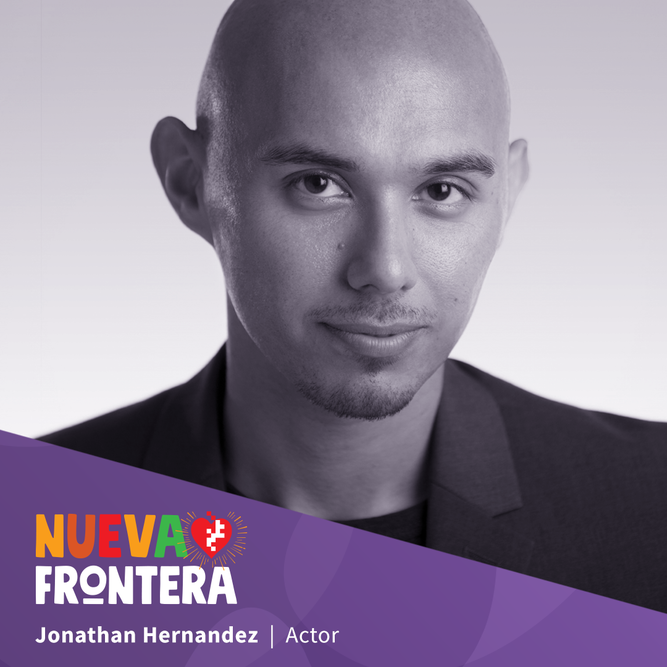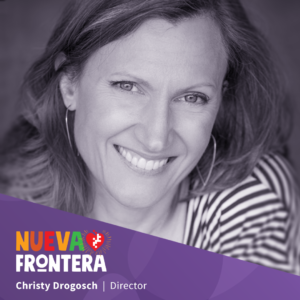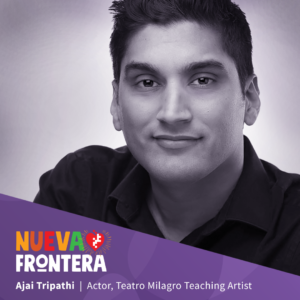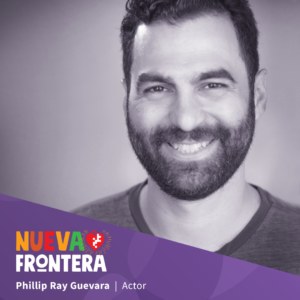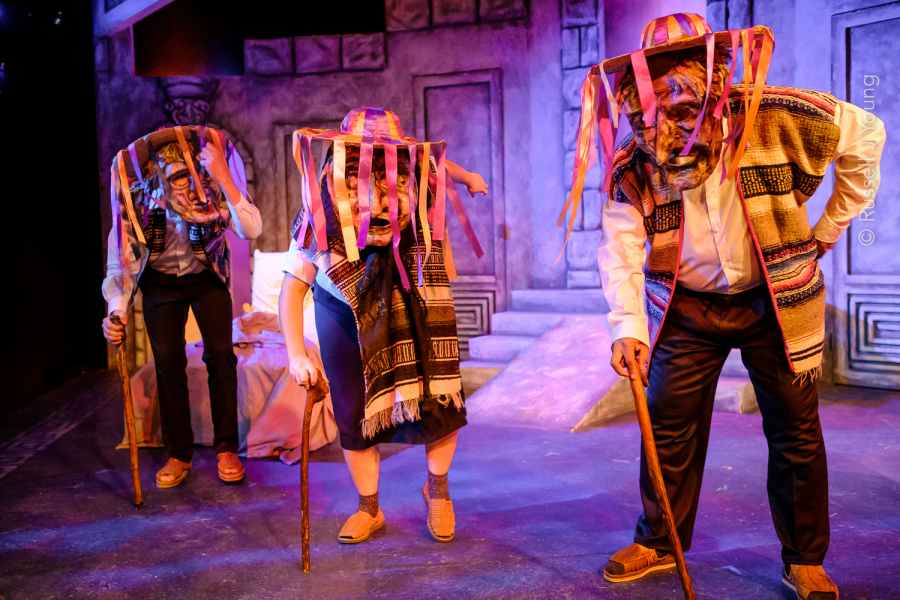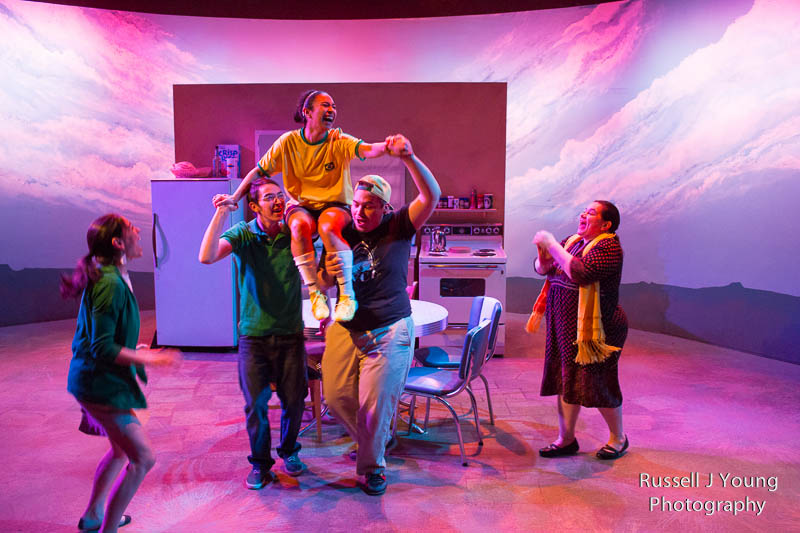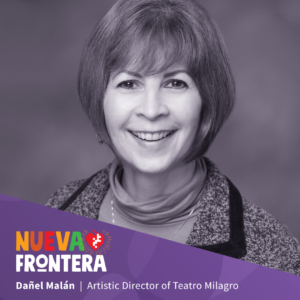We’re embarking on a digital series to expand Milagro beyond walls and make art accessible during COVID-19. Nueva Frontera spotlights the individuals who make Milagro what it is, sharing stories, reflections, and creative content from our human network of Latino arts and culture.
Stay tuned for new videos and featured content from Milagro artists and theatre makers.
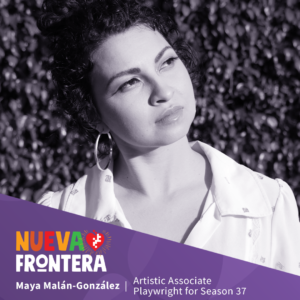 Maya Malán-González
Maya Malán-González
Maya Malán-González is a multidisciplinary artist focused on performing, writing and ensemble collaboration. She’s a lifelong member of Milagro in Portland, where she most recently performed in Wolf at the Door. Through her history with the company, Milagro commissioned her new play, A Xmas Cuento Remix, which is receiving a National New Play Network Rolling World Premiere with Milagro, 16th Street Theater and The Cleveland Public Theatre. In addition, Maya is an ensemble member with Teatro Luna West, where she recently premiered The Times, in which she was a core developer and performer. Maya’s story “Down the Side of the Mountain” is featured in Teatro Luna’s Audible Original audiobook, “Talking While Female and Other Dangerous Acts”. Her online blog series “Learning With Maya” can be found at Teatrolunawest.org/blog. Maya is also a company member with Cara Mia Theatre, where she was last seen performing in Deferred Action and De Troya. She has performed at The Edinburg Fringe Festival (Edinburg), Fool’s Fury Factory Festival (San Francisco), One Theatre World (Chicago), Carnaval of New Work (Chicago), and The Encuentro De Las Americas (Los Angeles). Maya received her B.F.A in Acting from The Theatre School at DePaul University with a concentration in Latino Studies.
Maya reads an excerpt of ¡Si, Se Puede! / Yes, We Can!, the bilingual children’s book by Diana Cohn, in anticipation of Teatro Milagro’s national tour of Maya’s new play, Huelga.
Years after her childhood acting debut with Teatro Milagro, Maya Malán-González is writing two new plays for Milagro’s touring education company to premiere next season. Huelga spotlights the struggles and accomplishments of Dolores Huerta, labor rights activist and co-founder of the United Farm Workers. The Teatro Milagro national tour of this new work launches in January 2021.
¡Si, Se Puede! / Yes, We Can! is written by Diana Cohn, illustrated by Francisco Delgado, and translated by Sharon Franco. Find out more at Cinco Puntos Press.
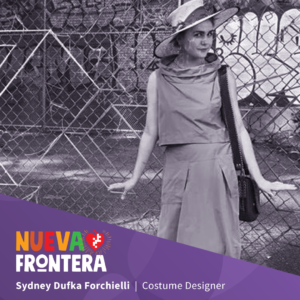 Sydney Dufka
Sydney Dufka
Sydney Dufka Forchielli is a visual storyteller and costume designer from Arch Cape, Oregon. She is interested in exploring the motivation of characters through the details in the clothing. Educated in Chicago and based on both coasts, Sydney spends her time jet setting across the continental 48 with her husband, Anthony Dufka Forchielli. Select credits include Fences, directed by Lou Bellamy at Portland Playhouse and Naked Mole Rat Gets Dressed, directed by Stan Foote at Oregon Children’s Theatre. Sydney holds a Bachelor of Fine Arts in Costume Design from The Theatre School at DePaul University, where she studied under Nan Cibula-Jenkins. See more of Sydney’s work at sydneydufkadesigns.com
Blast OffPrint and paint Sydney’s illustration below!
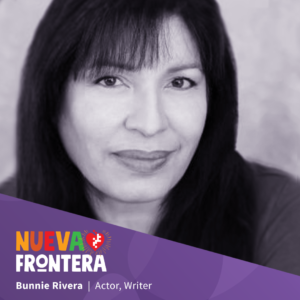 Bunnie Rivera
Bunnie Rivera
Bunnie Rivera has been in the Hollywood entertainment industry for over 25 years and has appeared on many television shows and films including Suburgatory, Desperate Housewives and many others. She was an original member of Miracle Theatre, where her fearless leader literally handed her a broom, thus beginning a long relationship with Milagro. She also served on their board. She has been venturing into writing and producing for a long time and wants to thank all the actors and Milagro for the opportunity to put her very first writing effort to the screen. She wrote this story 20 years ago. It is based on a true story and she’s excited to bring it closer to the screen. She hopes it helps to break down barriers in some way. Thank you for watching and remember, people are real.
Enjoy this digital table read of Bunnie’s short film. Based on real lives, This Land Is follows a young boy’s journey as he begins a search for his chosen family.
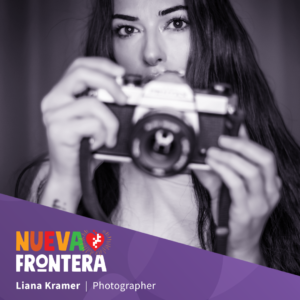 Liana Kramer
Liana Kramer
Liana Kramer is a photographer and photo editor based in Portland Oregon. She started creating her photography portfolio in California in 2015 capturing headshots for actors, singers and performers. Eventually she made the move back to Portland in 2016 where she put all of her focus into photographing live concerts and building photo editing skills with Photoshop and Lightroom. Over the years she has had the chance to work on all styles of photography such as product, portrait, family, beauty, and food. And most recently has had the pleasure to be a photographer for Milagro.
Liana discusses the process of documenting live performances, sharing images from Milagro’s most recent production, En el tiempo de las mariposas.
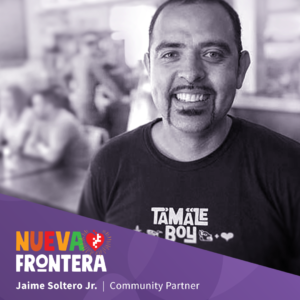 Jaime Soltero Jr.
Jaime Soltero Jr.
Jaime Soltero Jr. started Tamale Boy as a catering company in 2008 called Mayahuel Catering. Tamale Boy has evolved into a food truck catering and restaurant business with two Portland brick and mortar locations. Soltero Jr. and his team aim for Tamale Boy to be a fun and approachable dining option that is affordable for everyone. Tamale Boy offers a seasonally changing menu designed to highlight cuisine from various regions throughout Mexico.
Jaime joins Executive Chef of King Tide Fish & Shell Lauro Romero to demonstrate how to satiate your antojitos (cravings) for traditional Mexican sopes.
Christy Drogosch
Christy has a BA in Spanish, Theater Arts, and Arts and Letters from Portland State University. She has a Master’s in Education also from PSU and is currently earning a Masters in Spanish Linguistics from New Mexico State University. She has been active in Portland theater for 20 years. She began the Teatro Español program at Teatro Milagro with Leila Bretón in 2001 when she co-directed La Barca Sin Pescador as well as taught acting and movement workshops for the program. She went on to direct a deconstructed version of Lope de Vega’s Fuenteovejuna, Nilo Cruz’s Ana en el Trópico, Fernando de Rojas’ La Celestina, and most recently, Caridad Svich’s En el Tiempo de las Mariposas.
Christy shares her history with Milagro and offers a gentle guided yoga session geared at working through distraction.
Reflections from Mariposas
En el Tiempo de las Mariposas
Ajai Terrazas Tripathi
Ajai Terrazas Tripathi is an Actor, Director, and Playwright from Corvallis, OR where he directed Bringing it All Back Home, No Exit, Doric Wilson’s Street Theater, Rhinoceros, and Bengal Tiger at the Bagdad Zoo, receiving his BA in Theatre Arts from Oregon State University. After graduating he produced and directed Stories of Discrimination, two original one-acts that focused on minority experiences with harassment, intimidation, and discrimination. He works for Teatro Milagro in Portland as a Performer, Teaching Artist, Development and Production Assistant, Tour Manager, and Education Director. He has promoted and championed bilingual arts education in schools, universities, and theatres, developing Milagro’s educational curriculum, and facilitating theatrical workshops for students of all ages throughout the United States. Acting credits include Duende de Lorca, B’aktun 13, Frida: un retablo, Searching for Aztlán, Broken Promises, El Payaso, Bi-, Judge Torres, and Huinca for Teatro Milagro, as well as Tenali: the Royal Trickster at Northwest Children’s Theatre & School, Troilus and Cressida for Salt and Sage Productions, and complex at Theatre Vertigo. He has also written and performed in Sueños de Fútbol, Mijita Fridita, and ¡Corre! ¡Corre!, three bilingual touring plays for young audiences, and a one person show Osho Returns.
Ajai performs an imaginative puppetry legend about the creation of the universe.
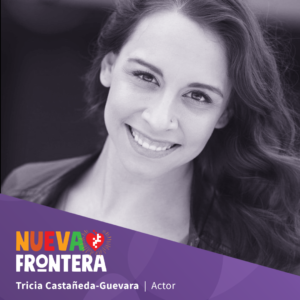 Tricia Castañeda-Guevara & Phillip Ray Guevara
Tricia Castañeda-Guevara & Phillip Ray Guevara
Tricia Castañeda-Guevara is a local actor and teaching artist, happy to be joining Milagro’s journey into la nueva frontera! You may have seen her on the MainStage in a touring production or just happily meandering about the space with a unibrow pretending to be Frida Kahlo! Favorite pandemic activities include making face masks, decorating her little one’s nursery, asking her husband to rub her feet, and making silly videos to keep you entertained! So be on the lookout!
Phillip Ray Guevara is an actor and director from San Antonio, Texas. He met his wife, Tricia, at The University of Washington’s M.F.A. Acting Program, and they bonded during their time together in stunt school. His hobbies include reading, writing, and rubbing his pregnant wife’s feet at the end of every day.
Auditioning online is a new challenge for many actors! Here, Tricia and Phillip share tips for making self-tapes during COVID-19.
In this whimsical instructional video, Phillip and Tricia demonstrate the best (and worst) ways to memorize lines.
Phillip offers a hilarious montage of what not to do when it comes to overthinking the slate.
Patricia Alvitez
Patricia is originally from Peru, where she studied ballet at the Escuela Nacional de Ballet en Lima and theater at La Asociación de Artistas Aficionados and El Club de Teatro de Lima. She is a former company member of the Peninsula Ballte Theatre in San Francisco. She joined the Milagro family in 2012 and has participated in five Dia de Muertos productions, plus Watsonsonville: A Place Not Here, La Segua, and Wolf at the Door. Other theatre credits include Grand Hotel and Young Frankenstein at Lakewood Theatre, La Ruta at Artist Repertory Theatre and was recently cast in the musical Last Stop on Market Street with Oregon Children’s Theatre. She is spending her time during quarantine in her studio drawing and painting and taking dance lessons online.
Patricia shares her experiences performing in Milagro’s annual Día de muertos devised production, showing how to create a traditional Day of the Dead skull look with face paint.
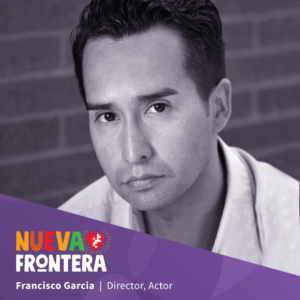 Francisco Garcia
Francisco Garcia
Francisco Garcia’s directing credits at Milagro include the world premieres of Emilio Rodriguez’s Swimming While Drowning and Olga Sanchez’s Broken Promises and the INGENIO Readings of Nelson Diaz-Marcano’s World Classic and Andrew Siañez’s Borderline. He recently directed Jose Cruz Gonzalez’s Tomás & the Library Lady and Joan Cushing’s Diary of a Worm, a Spider, and a Fly for Oregon Children’s Theatre. As a director and actor, he has worked on workshops and world premieres for such playwrights as Luis Alfaro, Naomi Iizuka, Michael John Garces, Marisela Treviño Orta, Josefina Lopez and Eric Coble. He is a proud member of SAG-AFTRA and Actors Equity Association and his recent acting credits include NBC’s Grimm, IFC’s Portlandia, A24 Film’s Lean on Pete, E.M. Lewis’ The Great Divide for Portland Shakespeare Project’s Proscenium Live Festival and JAW: A Playwrights Festival for Portland Center Stage. Visit his website at franciscodiegogarcia.com.
“As artists, it’s not just the art that we’re making but who we’re making it for.” Milagro Artist Francisco Garcia discusses his creative background and shares a dramatic monologue from Tino Does Time by Joann Farías, a play he appeared in on the Milagro stage in 2004.
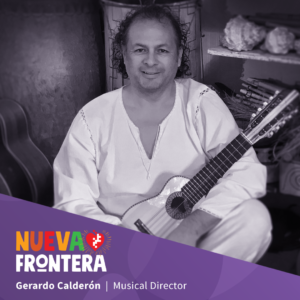 Gerardo Calderón
Gerardo Calderón
Gerardo is a composer, producer, and multi-instrumentalist. Born in Mexico City. He grew up surrounded by music, dance, and culture. While living in Mexico, Gerardo studied classical guitar at the Escuela Superior de Música in Mexico City. He also studied music theory at the Portland Community College in Oregon, and later, he studied music therapy for three years at Marylhurst University in Oregon. Gerardo is the musical director of Grupo Condor and Nuestro Canto and has pursued his interest in traditional Mexican music, Latin American folk music, and Pre-Columbian music. For the last eight years, Gerardo has been playing therapeutic music for elder facilities, from retirement centers to intensive care units. As a parallel activity to performance, teaching, and studying, Gerardo is an instrument artisan; he makes custom pan flutes, rain sticks, water drums, turtle boxes, and bombos (bass drums).
Gerardo Calderón plays original compositions in this intimate studio performance featuring drums, pan flute, and guitar.
In his own instrumental compositions, Gerardo blends Latin American folk, jazz, and contemporary rhythms from the Americas. He also combines different instruments from Latin America, such as string, wind, and percussion instruments, to create a unique, mellifluous sound.
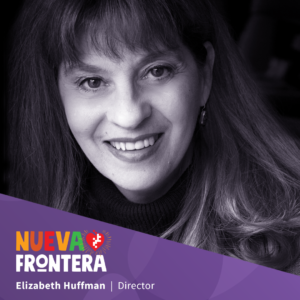
Elizabeth Huffman
Elizabeth received her theatre training at The University of California, New York Academy of Theatrical Arts, and in Oxford, England with BADA. She has taught Shakespeare and other classical workshops around the world and continues to travel and create theatre wherever she turns up. In 2009, Elizabeth served for two years as Interim Artistic Director for Classic Greek Theatre of Oregon in Portland where she now makes her home. She created the company’s first festival of arts: “It’s All Greek to Me” featuring performances nightly of theatre, dance, poetry, children’s shows, and new works. Elizabeth has directed four shows at Milagro including Watsonville: Some Place Not Here, American Night, Oedipus El Rey, and Amor Añejo. Her website is www.elizabethhuffman.com. She’s currently audition coaching online, so contact her if you need to brush up your Shakespeare monologues!
“Theatre is a shared community experience…for the artists who collaborate with each other to present it and for the audience who receives that effort into their hearts and minds.”
Elizabeth discusses what led her to theatre and her experiences directing with the Milagro familia in a one-on-one interview.
Milagro: How are you adjusting to the new normal?
Elizabeth: This is a very difficult time for all of us but specifically for me as a theatre artist who makes her living from gig to gig the future is so uncertain. I am attempting to remain calm and am working on my online coaching and courses. It may be the way forward for a while.
M: Are you in quarantine with anyone else?
E: Yes I am with a dear friend.
M: What has been your go-to snack?
E: Popcorn or my keto chocolate chip cookies
M: Have you had any free time for new hobbies or activities?
E: Not really anything new. But I am walking every day and trying to do some writing. Reaching out to colleagues and friends keeps me occupied.
M: Can you tell us a little about your background?
E: I was born in a very small town south of Pittsburgh called New Eagle, PA. We had one stoplight in my town and basically everyone knew everyone else. My mother’s family came from Syria and my father’s family from Germany and Italy, so I am a mixed breed with a large Mediterranean influence. I am a voracious reader and have been from a very young age, so I have always had a rather overactive imagination. That naturally led me to the desire to tell stories of my own or to act out the stories that I read. So I guess it was my destiny for me to end up in theatre, where I could do those things. I left my small town for the big city of New York when I was 19 years old and have been on the road ever since. I have a great deal of the Arabic nomad in me and I get bored being in one place for too long. Due to the melting pot of immigrants that defined the city of Pittsburgh, I have always been fascinated by other cultures and the desire to interact with people from all over the world. I have been a theatre artist for my entire life. I started out as a dancer, moved on to acting in college, and have created three theatre companies and been the Artistic Director of two other companies, including The Classic Greek Theatre of Oregon, which brought me to Portland.
M: Who are your biggest influences on your artistic style?
E: Peter Brooke, Ingmar Bergman, Michael Grandage, Akira Kurosawa, and Nicholas Hytner, as directors. Countless great actors from around the world are inspirational to me.
M: What do you like most about theatre as an art form?
E: I like the immediate gratification of a live audience and the interpretive theatricality of theatre and what can inspire the imagination of the audience. I am not really fond of realism onstage…I leave that to film…although the films I like best also are more theatrical in style. I love it when a collective group of people experience a powerful story together and it fills their conversations afterwards. Theatre is a shared community experience… for the artists who collaborate with each other to present it and for the audience who receives that effort into their hearts and minds.
M: Can you tell us about your contributions to Milagro?
E: I have directed four productions there so far: Oedipus El Rey, American Night, Watsonville, Some Place Not Here (I was not originally scheduled to that one but was brought in as a replacement director). Most recently, I wrote and directed Amor Añejo, this past year’s Day of the Dead show.
M: How did your experiences at Milagro shape your perspective on the theatre, on art, on your community?
E: Milagro is familia…we may be a little dysfunctional at times, like all families, but we all love what we do. I really adore all of the actors that I have worked with there, and I deeply appreciate the passionate and highly theatrical storytelling of the Latinx culture. José and Olga were my first friends from the theatre community in Portland to reach out to welcome me when I arrived as an Artistic Director of CGTO, and they have been dear friends ever since. Working in that theatre also presents staging challenges and solving them is fun. I wish that more people from the Portland theatre community would come out to see and support the work they do, especially the Spanish language plays, which I always learn from and enjoy. When actors are playing in their native language, they are so exciting to watch because they are acting without a language barrier; therefore, their natural body language and emotional truths are brought forward.
M: Can you share some of your favorite memories or shows at Milagro?
E: I try to see as many shows as possible when I am in town, and in every case, I always find something that I appreciate and learn about when I see the work. I do love the Day of the Dead shows and have seen some really beautiful ones that always make me cry. I think for me personally, Oedipus El Rey still holds the most special place in my heart. That was a production where all the elements came together with a harmony and beauty that expressed what is the best kind of collaboration between artists.
M: Can you tell us a little about what you’re working on now?
E: At the moment, I am working on some writing, am currently negotiating some out of town directing projects, and am developing my musical Bon Temp Rouler at the Shakespeare Cafe.
M: What role do you think art plays in times of crisis?
E: We are the chroniclers of our times and this crisis is fuel for many creative endeavors…I look forward to seeing what comes out of this from our playwriting community and our devised work together.
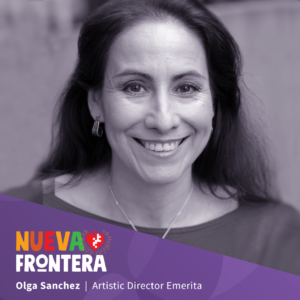 Olga Sanchez
Olga Sanchez
Olga Sanchez served as the Artistic Director of Milagro, the Pacific Northwest’s premier Latino arts and culture organization, from 2003 to 2015. An actor, director, writer, and educator originally from NYC, she served as Co-Artistic Director of the People’s Playhouse in the East Village, as a founder and Artistic Director of Seattle Teatro Latino, for which she wrote and directed several pieces celebrating the beauty of Latino cultural heritage, and as a founder of La Casa de Artes, a Seattle-based non-profit organization dedicated to raising the visibility of Latinx arts and artists in the community. For Milagro, she directed over 25 works including: El Quijote by Santiago García; García Lorca’s Bodas De Sangre (in the original Spanish) and Blood Wedding; Nilo Cruz’s Lorca In A Green Dress (Drammy Award, Excellence in Direction), and several world premieres including Caridad Svich’s Guapa and Rubén Sierra’s When The Blues Chase Up A Rabbit. Her devised work includes five Día de muertos shows, including ¡O Romeo! (Drammy Award, Outstanding Achievement in Devised Work).
“Let’s call it making theater with my friends! Because that’s the truth.”
Olga discusses her creative influences, art during COVID-19, and what she loves about theatre in this one-on-one interview with Nueva Frontera programmer Miguel Acuña.
Miguel: I just wanted to thank you again for dedicating some time this afternoon to chat! I know you’re busy with teaching, so I appreciate your time.
Olga: You’re welcome.
M: How are you adjusting to this new normal?
O: Well, I just moved to Lancaster, Pennsylvania in January, and settled into this new apartment…We were going into Spring Break and I was in the middle of directing Policarpa by Diana Burbano, which was a script I encountered at Milagro as part of the Ingenio new work festival… anyway, I was finally getting into a groove of classes and my materials and directing when the school announced that, coming back from the break, we would be coming back to online classes… so, all of a sudden, I had to do a lot of training, figuring out what were the best practices, because it’s one thing to create classes that you know are going to be online, but it’s another thing to work with a syllabus that you’re expecting to do in a classroom. How do you turn an acting class into an online experience? Suddenly, you have to rethink the thing you’re finally getting the groove of… so, it’s all been a transition, and I’ve just been plugging away at it.
M: Are you in quarantine with anyone else or is it just yourself?
O: Yeah, I’m here with my mom who I am concerned about. Going out and buying groceries, I’m not worried so much about me, it’s about how many times I wash my hands along the way and how many times on the way back…
M: Do you have any go-to snacks that you’ve developed in your time in quarantine?
O: I don’t know if my mom has a go to snack, but for me it’s fig newtons and popcorn. Popcorn has been a long time go-to, it’s comfort food, popping some popcorn is important for me.
M: Have you had any free time for any new hobbies or activities since this began?
O: No. (Laughs) You know what has turned out to be really lovely? So I’ve been here in this new place since January and really missing my friends (laughs) and really missing my relationships… so because everyone else has had to go and hunker down, I’ve had lovely hangouts with people I haven’t seen in months. Really, the upside of this whole thing has been being able to reconnect with people that I miss very much.
M: Can you tell me about your background before joining Milagro?
O: I was a freelance actor and director, originally from New York, and then I moved to Seattle. There I co-founded a company called Seattle Teatro Latino where I became the artistic director. That’s how I ended up meeting Milagro because of a project I produced called Una Noche de Revolución. Juan Baca Saavedra, one of the playwrights, was living in Portland and said, “You should bring this to Milagro,” so I went and met with [Milagro Executive Director] Jose and they hosted us and we were able to do our show for two nights back in the late 90’s. I was later invited to direct a play by Rubén Sierra, rest in peace, and was also invited to adapt, along with Kathleen Alcála, her novel, Spirits of the Ordinary which I also directed. It was during that process and meeting with Jose that I was invited to come on board as the artistic director for the company.
M: Can you tell us a little bit about any influences on your personal artistic style?
O: In the early 2000’s I had the chance to go to Latin America with a few plays I directed. I went to Peru, Colombia, Venezuela, and Mexico. I was struck, particularly in Peru, by the physicality, the poetry, the muscularity of the theater. It was much less that the whole “sit down and have a cup of coffee and talk about something” kind of theater and more of a full-bodied experience. I was just so inspired by that and I thought, “Now THAT is the theater I want to make”. So, getting to work at Milagro and doing work by Latin American and Latinx playwrights, who embodied and called for that in their texts, was just a marriage of aesthetics and physicality that I was looking for. I’m also a fan of color and bright sound and bold statements, and I found a perfect laboratory for that at Milagro.
M: What do you enjoy most about theater as an art form?
O: The immediacy of it. That we can’t be somewhere else and, at it’s very best, when the art is great, we are all focused on the now, we’re not distracted thinking about our shopping. It engages its audience as much as it engages its performers, the stage management, the backstage crew. It has intentionality to it, the artists who are engaged in it are saying “This is what we mean to say” or “This is the discussion we want to propose to you and we’re going to propose it to you over the course of two hours and we’re going to go through a journey together in which we are going to learn something more about ourselves and about humanity and about our world” in such an engaging way that you cannot look away. At it’s best, it is the visceral, immediate, intellectual exposure with the human living experience.
M: Can you tell me about some of your contributions to Milagro when you served as Artistic Director?
O: I had the good fortune of arriving just as Milagro was launching its Spanish language program and I was able to see its first production, La barca sin pescador, in 2003. I was really delighted by this and also saw so much potential. One thing I was able to implement was a training program in Spanish which lasted for two years. This program, taught the first year by Christy Drogosch and the second year by Pablo Jimenez, existed nowhere else in Portland. It just felt like the right thing to do because here were some really talented folk who grew into such a beautiful ensemble that really supported the development of the Spanish language theater making that Milagro went on to do. I also launched a program called Posada Milagro. It is a multi-tiered project, a free open-house event in the spirit of the Christmas Posadas [of Mexico] where you invite the neighbors and share food and sing songs, such a lovely celebration leading up to Christmas Day. I also created a few art education programs with Roosevelt High School and their SEIS [Spanish English International School] program, working with the incomparable teacher Elena García-Velasco… oh, and the Pluma Nueva program, which was a program to bring high school students to Milagro to learn how to take their own writing and turn it into some dramatic writing format and then mount it on stage. They would each write a short play and then perform in each other’s plays, it was very cool. I also did a lot of devised work that I am really honored and happy to have done, including a lot of Dia de los Muertos work, and of course a ton of new plays!
M: Can you share some of your favorite memories or shows at Milagro?
O: It’s hard to pick favorites! The work that I’m doing now in education has me looking at old plays by way of teaching them or writing about them. Currently I’m writing about O, Romeo, which was the last Dia de los Muertos play I devised and directed, and that was such a rich experience and it had so many great people involved and the collaboration was really terrific. Guapa by Caridad Svich is another one of my favorites, which I’m going to be teaching about in a week. I’ve also been thinking about Barrio Hollywood by Elaine Romero, because of its theatricality, that’s what drew me to it. I’ve also been thinking about Elliot, A Soldier’s Fugue, one of my favorite plays of all time. I’ve been thinking about Tino Does Time by Joann Farias, which I directed my first year working at Milagro full-time. I worked with [past Milagro artist] Francisco Garcia when he was a young actor, he played Tino, and now he’s blossomed into a full-fledged artist, a director and educator to be contended with.
M: How did your experiences with Milagro shape your perceptions on theater, art, and community?
O: Well, interestingly, one of the reasons I took the job was because I was thinking that I would become a stronger director, and I think I did. I certainly became a stronger devisor. I had such great feedback from so many different designers and other directors who saw the work and development. I learned a lot from them. I learned much more about the craft and how to orient myself in the task of directing and what to look for. As far as community, my Masters Degree is in human development and primarily geared towards bicultural development, so I learned that community can really be family. Posada Milagro came out of my education and my thesis on bicultural identity. In my time with Milagro, I got used to engaging with the different members of the Latinx community, organizations such as Latino Network, Hispanic Chamber of Commerce, schools that had significant Latinx populations and the like… it got to a point when I would go invariably to some non-Latinx specific engagement or panel in Portland, it would become clear: “Oh yeah, we are not the majority here” because I might be the only person there representing the Latinx community. I got so used to being in a Latinx world that moving out of it, even stepping away from it briefly in non-Latinx spaces was a reminder that we didn’t live in a Latinx world.
M: If you were back at the helm as artistic director, would you do anything differently?
O: If you had asked me that question a month ago, I might have had a very different answer than the one I’m going to give now, because I think we are absolutely going through a time of change. I think that when this pandemic is over and they let us go out of our houses again we’re going to be walking out into a different set of circumstances. I mean, one of the biggest industries that doesn’t have the luxury of riding it out is theater, especially small and medium sized theaters because we’re always juuuuust making ends meet… Jose has been a terrific executive director at figuring out how to keep the boat afloat under many different difficult circumstances including the 2008 recession. We have been very fortunate with the support of different foundations that recognize the value of Milagro’s work, but foundations are going to have so many companies knocking on their door and there’s only so much they can do to turn funds around when we need to pay the bills next week. And so, I think that, if I were to come back and be at the helm, the primary thing for me would be to figure out how we reconnect with our audiences. I mean, we don’t know what the circumstances of the audiences are going to be. What can we do to support them and to give them the entertainment and the hope and the support and the laughter and the weeping together and all those things that theater is good at. How do we focus on the artmaking that we do so that we can bring our very best under whatever circumstances we have? How do we support our audiences to come back to us or come to us for the first time, if that’s the case, and how do we build a friendship that has been separated by calamity? I think that’s the global question, this mending that has to happen both for ourselves as a company and with our audiences and then with our community at large. It’s less about specific programs, it’s more about addressing the newer normal, the thing to come, and how we focus on those bigger questions, and how we serve.
M: What role does art play during this current circumstance we find ourselves in?
O: It gives us hope, it distracts us. I’ve always thought of theater as a forum for our heroism, our potential, as well as our frailty, our vulnerability. Acknowledging that is an important part of being human. If we all go around thinking we’re superheroes and we’ve got it all under control… that’s a lie! And so I think there’s an honesty to art, it’s a loving honesty, even if it’s painful. I think it allows us to look at things realistically and also if you look back over art, you look at the ways we have survived through calamities in the past. There are a lot of things that art does; art wants us to think, art wants us to engage, art doesn’t want us to eat it and be done with it.
M: Can you tell us a little bit about what you’ve been working on since you left Milagro?
O: I left in the fall of 2015 to pursue my PhD which I have since attained… so this past December I got my PhD in Theatre Arts from the University of Oregon…
M: Congratulations!
O: Thank you very much. And I had found out earlier in the year that I had this position here at Franklin and Marshall College in Lancaster, Pennsylvania, as a Visiting Assistant Professor of Theatre which I am just thrilled about… The reason I went into academia was that I wanted to teach Latinx theater. When I was coming up it wasn’t a subject, it wasn’t something that was taught in higher education and it’s still kind of rare. I just found out a couple weeks ago that I will have a job, thank heavens, at Middlebury College. I’ll be an Assistant Professor of Theatre, and I’ll be teaching Latinx theater there…I’m very grateful and excited to be heading to Vermont this summer if, you know, they don’t close the borders!
M: What do you miss the most about Milagro, besides Jose?
O: The artmaking. The rehearsal room. And by that I don’t just mean the space, obviously, but the people in the rehearsal room, making theater with people. Hands down. Let’s call it making theater with my friends! Because that’s the truth.
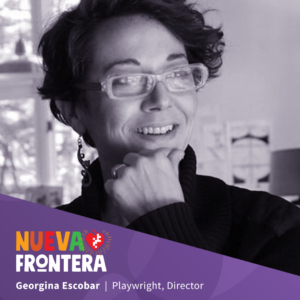 Georgina Escobar
Georgina Escobar
Georgina Escobar is a Ciudad Juarez native and NYC-based playwright and director. She is a MacDowell Fellow, Djerassi Resident, and recipient of the National Kennedy Center Award for Theatre For Young Audiences. Her work has been featured in the Kilroys List (StoneHeart), The Texas Review (Matted), Los Bárbaros (Ribbon About A Bomb), and New Passport Press (Cósmica). Her work has been produced across the USA and participated in the ASSITEJ festival in Denmark and Sweden. Her plays have been produced and developed at INTAR, Clubbed Thumb, Lincoln Center, Bushwick Starr (NY), Two Rivers (NJ), Milagro (PDX), Aurora Theatre (GA), and more. Website: www.georginaescobar.com
Artist Georgina Escobar shares her experiences writing and directing for the Milagro stage, reflecting on Milagro’s collaborative environment and her own musical approach to productions.
Georgina made her Milagro debut conceiving and directing the trademark Dia de muertos devised production for 2016, El Muerto Vagabundo. She returned in 2017 to direct El Payaso, and in 2018 to direct the world premiere of her original play, Bi-. Most recently, she wrote and directed the 2018 Dia de muertos production, ¡Alebrijes!
Dañel Malán
Malán co-founded Milagro with her husband, José Eduardo González, and in 1989, she created the bilingual touring program, Teatro Milagro, which tours nationally to schools, colleges, and universities. Ms. Malán researches and develops script ideas and works with playwrights, directors, composers, and choreographers for the creation of many of the productions. She has also written several bilingual scripts for Teatro Milagro, which include Cuéntame Coyote (2005, 2014) and FRIDA, un retablo (2006, 2013). Malán received her BA in Theatre Arts from the University of California, San Diego and her MS in Curriculum in Instruction from Portland State University.
Learn to draw your own Frida Kahlo style self-portrait in this instructional video by Dañel Malán, Artistic Director and founder of the bilingual touring education program, Teatro Milagro.
This self-portrait video comes from Teatro Milagro’s digital packets for homebound students. The K-8 packet focuses on the life of the young Frida Kahlo—her world of living in isolation and her creative endeavors that resulted in over 100 self-portraits.
Donate through the Milagro Square site (https://teatro-milagro.square.site/) to receive the full K-8 packet, which includes: a video of a Teatro Milagro performance about the young Frida Kahlo (complete with fun dance-along moments for kids to enjoy), this instructional video on how to draw your own self portrait, and bilingual writing activity worksheets.
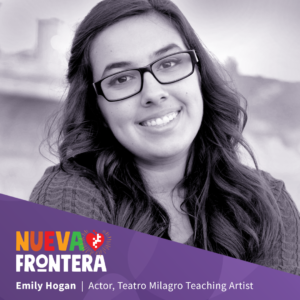 Emily Hogan
Emily Hogan
Emily is a recent graduate of the University of Portland undergraduate theater program, where she studied acting and dramaturgy. She is from Lompoc, CA. You may have seen her recently on the Milagro stage in A Xmas Cuento Remix or at Shaking the Tree in Made to Dance in Burning Buildings. Emily is a current Teatro Milagro Teaching Artist. Find her on Instagram at @emfayehogan.
Enjoy Emily’s dulcet tones in this special quarantine performance of “Noche de paz” from A Xmas Cuento Remix.
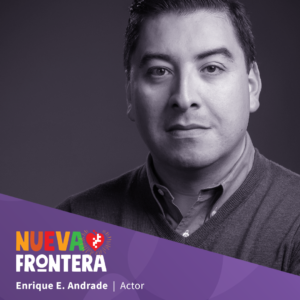 Enrique E. Andrade
Enrique E. Andrade
Originally from Mexico City, Enrique is a graduate of the University of Oregon with majors in Spanish Literature and Philosophy and a minor in Political Science. Enrique became a Master Level Court Certified interpreter in July 2001 and began as a Staff Interpreter II with the OJD in December 2001. When Enrique is not interpreting in court he spends his time as a local actor on stage and screen and as Voice Over talent. Enrique has been a Milagro MainStage actor since 2006 and considers Milagro his artistic home.
Enrique wraps up our retrospective on The Corrido of the San Patricios with heartfelt words and a montage of photos from the unseen production.
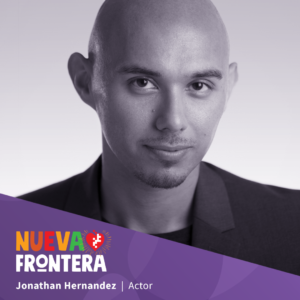 Jonathan Hernandez
Jonathan Hernandez
Jonathan is an Arizona native—making moves, creating theater, and telling stories since 2005. His last show at Milagro was in the 2015 production of La Muerte Baila. In 2018, Jonathan encountered a wonderful opportunity to work with Radical Evolution and Teatro Campesino to workshop The Corrido of the San Patricios. He thanks Milagro for the opportunity to be part of a community where he can express himself and hone his craft.
The Corrido of the San Patricios actor reflects on the character of Lochlan O’Brien.
Jonathan shares a reading from his passion project, Mijo. This contemporary drama for the stage follows a Mexican-American family as new revelations come to light over the course of Christmas dinner.
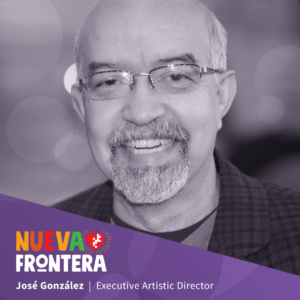 José González
José González
José’s background includes ten years as a freelance scenic designer working in Oregon, Texas, and California. He founded Miracle Theatre Group in 1985 with his wife, Dañel Malán. José holds an MFA in Theatre Arts from UCLA and a BA in Humanities with an emphasis in Philosophy and Arts History from the University of Santa Clara. In 1997, José was recognized as a Community Treasure by TACS-PGE/Enron. He has also received awards for “Outstanding Contribution to the Hispanic Community” from IMAGE of Washington County, 1992, and a Dramalogue Award for Excellence in Set Design for The Hostage, 1983.
Milagro’s Co-Founder and Executive Artistic Director kicks off the first digital programming series with a short introduction.


